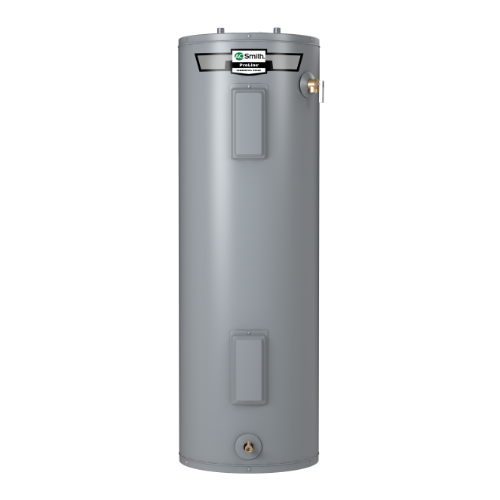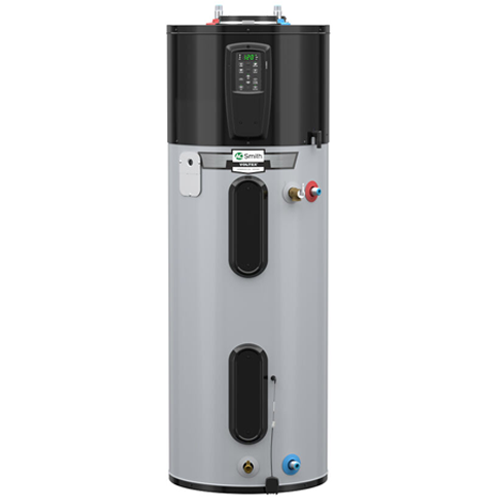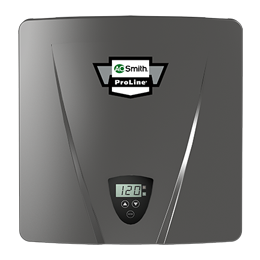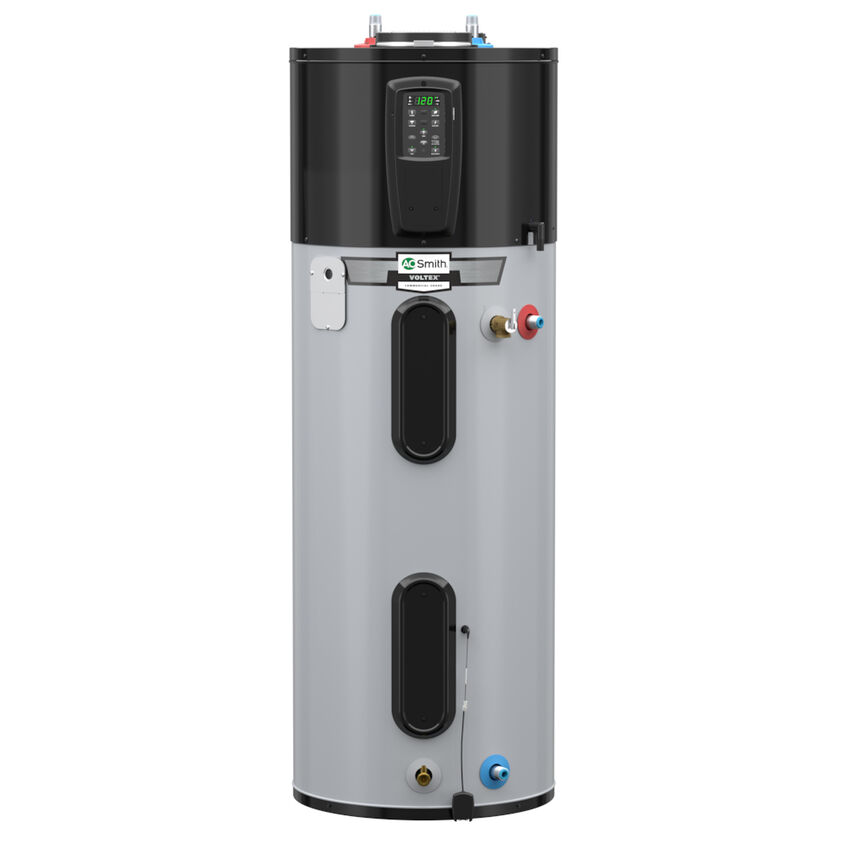
What Are the Advantages and Disadvantages of a Heat Pump Water Heater?
Table of Contents
The Pros & Cons of Heat Pump Water Heaters
Heat pump water heaters pull heat from the air around your home and transfer it into your water tank. They use this heat to warm your water for showers, dishwashing, and other household needs. Most homeowners save money over time, even though these units cost more upfront. Understanding the advantages and potential drawbacks can help determine if this technology makes sense for your specific situation and needs.
Are you curious about your home's heat pump venting requirements? Find a qualified installer near you to get answers.
What Is a Heat Pump Water Heater & How Do They Work??
A heat pump water heater is a system that uses refrigerant as the primary heating source instead of electric elements. It works by transferring heat from the surrounding air to the refrigerant inside the system, where it is then compressed to increase the pressure and temperature, before a condenser enables the heat transfer from the refrigerant to the water in the tank.
This process uses significantly less energy than directly heating water with electric resistance elements, which makes heat pump water heaters highly efficient. Compared to standard water heaters, certain heat pump models are $600 cheaper to run per year - that’s $6,000 over 10 years.
These heat pump water heaters, like the ProLine XE® Voltex®, come with user-friendly features like temperature control, different operating modes, and diagnostics to keep things running smoothly.
Start saving on your energy bills and shop for Hybrid Electric Heat Pump Water Heaters using a water heater selector tool.
Heat Pump Technology and Energy Transfer
Heat pump water heaters pull heat from the air around them and move it into your water tank. This process uses existing warmth to heat your water efficiently. The system starts by drawing in air from your basement or garage and pulling the heat from it.
Even when the air feels cool to you, there's still enough warmth for the heat pump to use. The unit then heats up this warmth and transfers it directly into the water in your tank, giving you hot water while using less electricity.
Essential Components: Compressor, Evaporator, and Condenser
Heat pump water heaters consist of three main parts, with the most important being:
- Compressor: Acts as the heart of the system, heating up a special fluid to make it hot. This part runs all the time to move heat from the air to your water.
- Evaporator coil: Pulls heat from the air around your unit and captures it. This part needs good airflow to work right, which is why your unit needs enough space around it.
- Condenser: Takes the heat and puts it into the water in your tank. This part handles the heating process that keeps your water hot.
Check out our comprehensive guide to learn more about how heat pump water heaters work.
What Are the Advantages of a Heat Pump Water Heater?
Advantages of heat pump water heaters include their efficiency, lower running costs and tax credits.
High Energy Efficiency
Heat pump water heaters are the most efficient type of electric water heater, with the potential to reduce water heating costs by up to 73%. Because they transfer energy rather than useelectricity to create heat, they use around a quarter of the energy of conventional water heaters.
A. O. Smith hybrid heat pump water heaters have a uniform energy factor (UEF) between 3.0 and 4.0 compared to a UEF of around 0.93 for conventional tank water heaters. Smart features and additional operating modes can also improve energy efficiency. For example, vacation mode means households can save money on their utility bill by heating their water to a lower temperature when they are away from home.
Long Lifespan
The stainless steel heating elements present in many heat pump water heaters can last up to three times longer than standard copper elements. Depending on the type of heat pump you choose, a system can last from 10-20 years - a relatively long life expectancy, especially when considering the savings each year.
Lower Running Costs
Compared to standard electric water heaters, heat pump water heaters use a quarter of the electricity. According to the Department of Energy, water heating accounts for 18% of energy used. This could result in savings of up to $600 a year.
Tax Credits
ENERGY STAR®-certified heat pump water heaters qualify for a 30% Federal Tax Credit on the total cost up to a maximum of $2,000. Some states also offer added incentives and rebates for high-efficiency appliances. Tax rebates can also help to lessen the upfront costs that come with installing the heat pump.
Simple Installation
As long as you choose the right space to account for adequate airflow, surrounding environment temperatures, and potential electrical work, installing a heat pump is no more complex than a standard electric system.
Other options include the 120V Plug-In Hybrid Electric Heat Pump, which plugs into a standard 120V wall outlet, making installation more simple.
Environmental Benefits and Carbon Footprint Reduction
Heat pump water heaters use 70% less electricity than traditional electric models. This reduced energy consumption lowers your household's environmental impact. You'll save money on utility bills while using more efficient technology.
Reduced Noise Output
These units run much quieter than most people think they will. While you'll hear some sound from the fan and compressor, it's typically no louder than your refrigerator or dishwasher running. Many homeowners are pleasantly surprised by how quiet these units are, especially when installed in a basement or garage.
What Are the Disadvantages of a Heat Pump Water Heater?
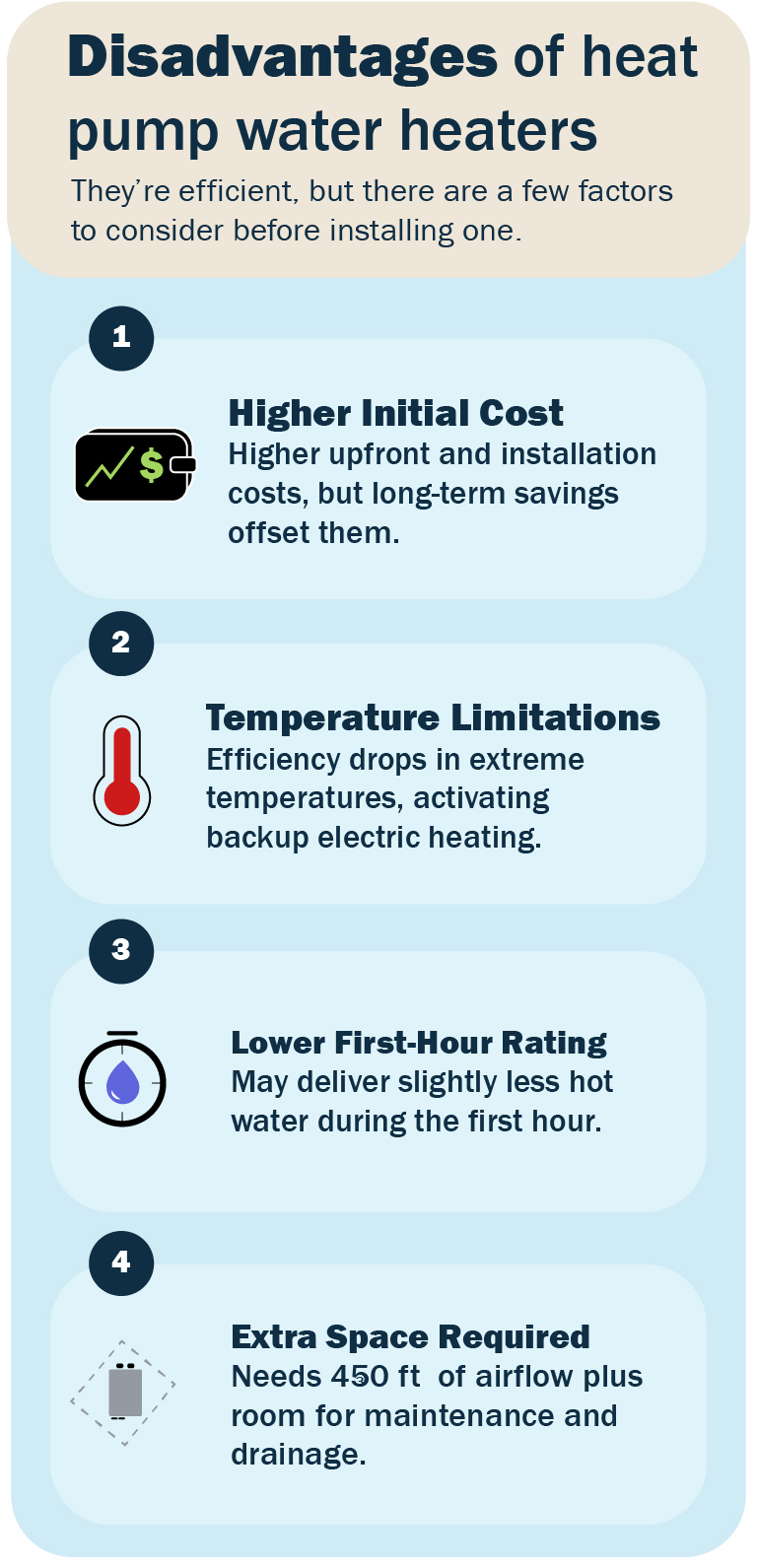
While a heat pump is an excellent source of hot water, there are a few disadvantages of a heat pump to keep in mind.
Higher Initial Cost
Installation costs can be more expensive for a heat pump than they would otherwise be for a standard tank or tankless water heater. However, a combination of tax rebates and the lower running costs of a heat pump water heater more than compensate for the higher costs, and you'll recover the difference within 3 to 6 years.
Low/High Temperature Operation Limitations
In summer, heat pumps work very efficiently and use less electricity than traditional water heaters. However, at colder temperatures, the heat pump may have to work harder.
Hybrid electric heat pump models have auxiliary electric heating elements that allow conventional operation in colder or hot conditions. Energy efficiency drops as the unit increasingly relies on auxiliary electric heating.
For example, A. O. Smith heat pumps operate between 37 degrees Fahrenheit (3 degrees Celsius) and 120 degrees Fahrenheit, but backup heating will activate at temperatures outside this range.
First-Hour Hot Water Rating May Be Lower
Depending on the model, the first-hour rating of a heat pump water heater may be slightly lower than an equivalent-sized electric or gas storage water heater.
Need Extra Space
A heat pump water heater needs 450 ft³ of free space to provide sufficient airflow for the heat pump, as well as space for periodic servicing. The heat pump water heater must also be installed in an area with a level floor, close to the center of the plumbing system, that will not freeze during colder months.
You’ll also need space for an additional connection for condensate.
If this type of space is not available, ducts can be installed to provide the water heater with the needed air.
Initial Installation Considerations
Installing a heat pump water heater is straightforward when you work with a qualified professional who can assess your space and electrical setup. Your installer will make sure you have enough room for airflow and verify that your electrical system can handle the unit and any needed upgrades. While the setup involves a few more steps than an electric model, professional installers are familiar with the requirements.
How Do Heat Pump Water Heaters Compare to Other Water Heaters?
When choosing a water heater, alternatives to consider include electric tank water heaters and tankless water heaters.
Heat Pump vs. Electric Tank Water Heaters
Points to consider when evaluating a heat pump against an electric storage water heater include:
- Energy usage: Heat pump water heaters are a lot more efficient than standard electric tank water heaters and use 70% less electricity.
- Price: The purchase price is around double that of a similar storage tank water heater. However, the difference is partially offset by rebates, tax credits, and the overall higher efficiency of heat pump water heaters.
- Power supply: The 240-volt models require the same main power supply as standard water heaters, while 120-volt heat pumps can be run off of a standard wall socket.
- Installation: Installation requirements are similar, but heat pumps are best installed in basements or garages to allow sufficient airflow over the evaporator.
No Tax Credits or Rebates Available
*Many factors affect the actual performance of a water heater. This represents our closest approximation of your likely experience with this water heater in your local area, but actual performance may vary depending on factors beyond our ability to control or estimate.
Heat Pump vs. Tankless Water Heaters
There are some notable differences between heat pumps and tankless water heaters, including:
- Hot water availability: Tankless water heaters heat water on demand, while heat pump water heaters need time to heat water stored in an insulated tank. On the other hand, some tankless water heaters may struggle to keep up with demand for hot water in larger homes or buildings where a greater amount of hot water is needed at any given time.
- Installation costs: Although tankless water heaters are cheaper, their installation cost can be much higher. They are also not eligible for federal tax incentives, making the total investment comparable to or higher than heat pump water heaters.
- Power supply: Electric tankless water heaters need a higher amp main power supply, drawing up to 32 kW of power from the main when in use.
*Many factors affect the actual performance of a water heater. This represents our closest approximation of your likely experience with this water heater in your local area, but actual performance may vary depending on factors beyond our ability to control or estimate.
Is a Heat Pump Best for You?
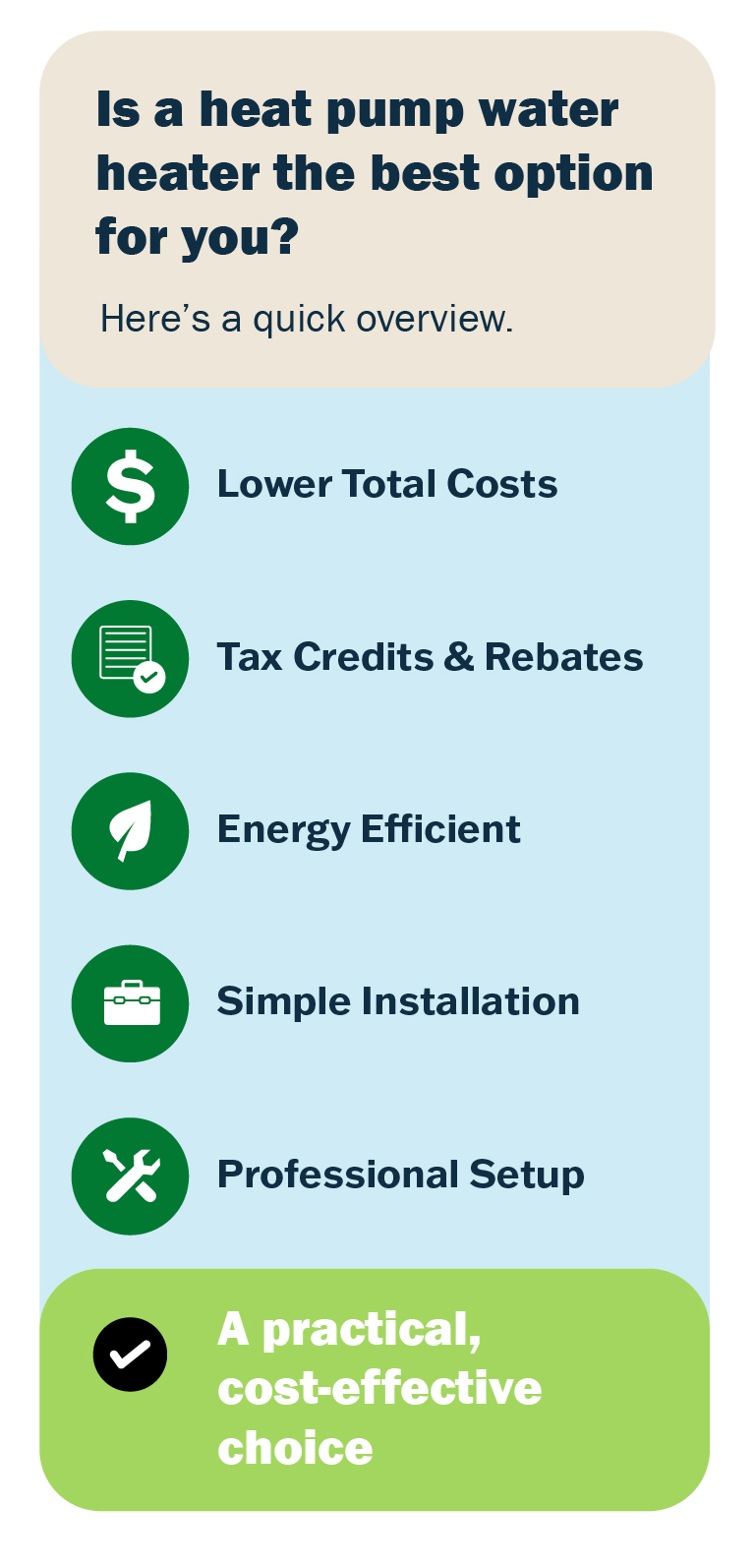
When assessing the advantages and disadvantages of a heat pump, the benefits generally outweigh the cons.
Although they cost more to install initially, they cost less to run in the long term. Over the life of a heat pump water heater, the total costs, including purchase, installation and electricity costs, are generally lower than for other water heater types.
Federal tax credits and local rebates help reduce initial purchase and standard installation costs and make the payback period happen much sooner.
Their installation is straightforward, requiring no special tools and techniques, apart from ensuring adequate air and temperature requirements for the heat pump. However, you’ll need to find a professional local installer to ensure proper setup and safe operation.
A heat pump water heater can be a practical, cost-effective choice when you need a reliable supply of hot water. If you have questions about what type of heat pump could be right for your needs, try our water heater selector tool to find your perfect match.
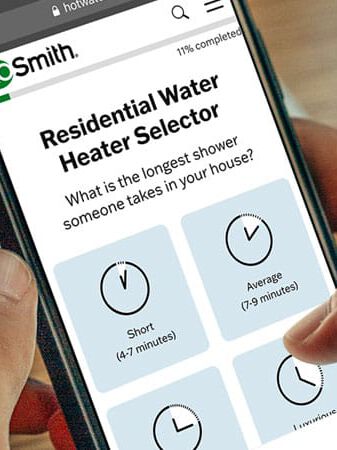
Not sure which water heater is right for you?
Take our water heater selector quiz to find the correct water heater for your home.
Frequently Asked Questions
Regular maintenance like cleaning the air filter every three months and getting a yearly checkup from a pro can help your heat pump water heater last its full 10-15 years. Keep temperature settings at 120°F or below to reduce strain on backup heating parts, and watch your utility bills for any large increases that might mean you need maintenance.
Heat pump water heaters cost more upfront than traditional electric units, but can save you up to $600 each year in operating costs. Installation may add to the initial cost, but the energy savings and available rebates typically pay back the investment within 3-6 years.
You might need a new water heater when your unit shows signs like uneven water temperatures, longer recovery times, visible rust or leaks, or much higher utility bills. Heat pump water heaters typically last 10-15 years compared to 8-12 years for traditional electric models, but upgrading before they break completely can maximize your energy savings and rebate opportunities.
Heat pump water heaters can get rebates and incentives that traditional electric water heaters can't. Many utility companies and local programs offer rebates of $500-$1,500, and you can check with local utilities to find current savings in your area, including any available tax credits.
